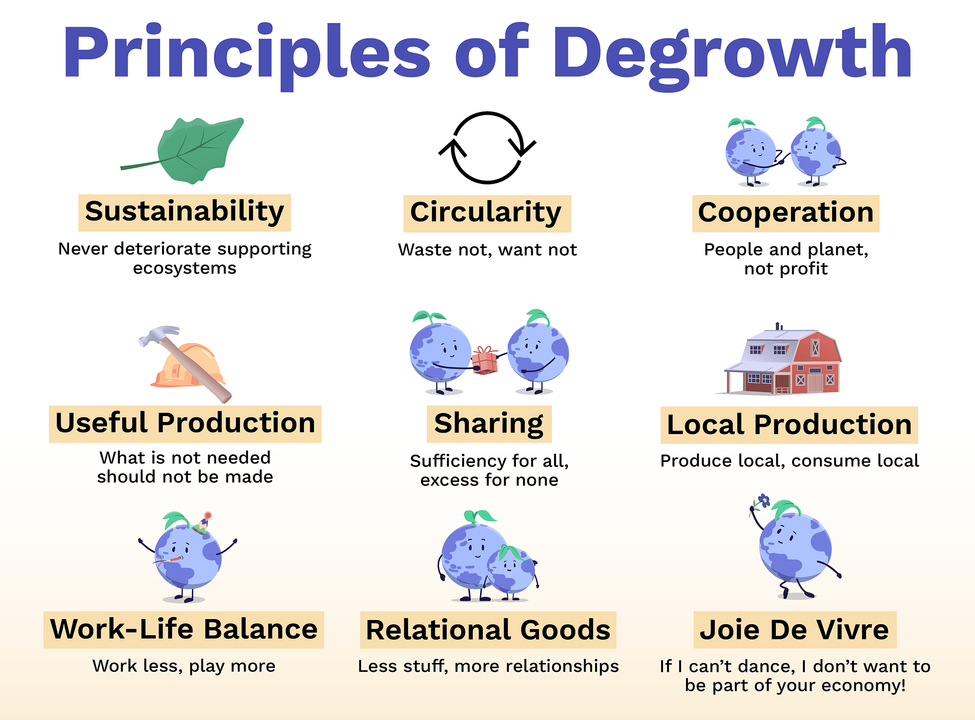Criminal Negligence in the Degrowth Movement? Why Transformative Criminology Matters for Systemic Change
ENVIRONMENT, 7 Jul 2025
Koenraad Priels – TRANSCEND Media Service
2 Jul 2025 – The degrowth movement has emerged as one of the most courageous and necessary responses to the ecological and social crises of our time. It dares to question the dogma of endless economic growth on a finite planet, and it offers a vision of sufficiency, solidarity, and ecological sanity. Yet, as the movement gains influence, it faces a crucial blind spot: an unwillingness, or perhaps an inability, to confront the criminality embedded in our economic and political structures. This is not simply a theoretical oversight—it is, in effect, a form of criminal negligence.
Degrowth scholarship has excelled at exposing the impossibility and destructiveness of perpetual growth. It has illuminated how extractivism, over-consumption, and financialization are driving us toward planetary boundaries. But too often, the conversation stops at the level of policy or technical reform. The deeper, more uncomfortable questions—Who benefits from the current system? Who writes and enforces the rules? Who is shielded from accountability when harm is done?—remain largely unasked. Without facing these questions, degrowth risks becoming another technocratic project, easily absorbed or neutralized by the very powers it seeks to challenge.
This is where transformative criminology becomes indispensable. Criminology, at its best, is not just the study of crime, but the study of how rules are constructed, who enforces them, and in whose interests. It asks us to look beyond the surface of “market failures” or “policy mistakes” and recognize that our global economy is not just unsustainable—it is criminally structured. In my own research on rentier capitalist capture, I have shown how elite interests have transformed states and institutions into enablers of systemic harm. Legal frameworks, regulatory bodies, and even academic discourse are routinely co-opted to authorize plunder and glorify exploitation. The result is a global system that operates as a state-sanctioned Ponzi scheme, with ecocidal and genocidal consequences.
Negligence, in both law and ethics, is not simply a matter of failing to act—it is a failure to act in the face of known danger. When the degrowth movement ignores or sidelines the criminological dimension of the polycrisis, it risks enabling the very harms it opposes. The evidence is overwhelming: ecocide and social exclusion are not accidental byproducts of growth; they are the predictable outcomes of a system designed to extract, exclude, and externalize costs. States and institutions have a binding legal duty, under international human rights law, to prevent and remedy systemic harm—not just to avoid direct violations. Academic and policy silos that ignore state crime perpetuate the illusion that incremental reforms or green tweaks can fix a fundamentally criminal system.
By failing to integrate a criminological analysis, degrowth risks criminal negligence. It leaves the architecture of power and impunity untouched, allowing elites to adapt, absorb, or repress any challenge that does not confront their rule-making authority. Transformative criminology, by contrast, insists on naming and confronting state crime. It asks: Who decides what is legal or illegal? Who enforces the rules, and who is exempt? How do institutions, including universities and regulators, become complicit in systemic harm? By foregrounding these questions, criminology exposes the structural violence and state crime at the heart of the global economy and provides the tools to move from critique to accountability—to demand not just new policies, but new systems of justice.
If degrowth is to fulfill its emancipatory promise, it must do more than advocate for less. It must demand justice. This means integrating criminological analysis into degrowth research, education, and activism. It means naming and confronting state crime—from ecocide to institutional capture and elite impunity. It means building alliances with transformative criminologists, legal scholars, and human rights advocates, and pushing for institutional and legal accountability, not just policy reform.
The future of human rights, democracy, and planetary survival depends on our collective willingness to challenge and transform the criminal architecture of the present. Degrowth has opened a space for imagining a world beyond endless accumulation. To realize this vision, it must also open itself to the radical, necessary insights of transformative criminology. Anything less risks repeating the mistakes of the past—mistaking technical fixes for systemic change, and leaving the rules of the game in the hands of those who profit from harm.
If we leave rule-making and enforcement to the very actors who have brought us to the brink, we are not just being naïve—we are enabling the continuation of state crime and systemic injustice. The time for criminal negligence is over. The time for transformative justice is now.
_____________________________________________
Koenraad Priels is an independent researcher and social-ecological activist whose work focuses on the systemic links between financial architecture, systemic violence, ecocide, and global inequality.
Tags: Capitalism, Conflict Analysis, Degrowth, Development, Economics, Ecosystem, Environment, Growth, Justice, Resources
This article originally appeared on Transcend Media Service (TMS) on 7 Jul 2025.
Anticopyright: Editorials and articles originated on TMS may be freely reprinted, disseminated, translated and used as background material, provided an acknowledgement and link to the source, TMS: Criminal Negligence in the Degrowth Movement? Why Transformative Criminology Matters for Systemic Change, is included. Thank you.
If you enjoyed this article, please donate to TMS to join the growing list of TMS Supporters.

This work is licensed under a CC BY-NC 4.0 License.
Join the discussion!
We welcome debate and dissent, but personal — ad hominem — attacks (on authors, other users or any individual), abuse and defamatory language will not be tolerated. Nor will we tolerate attempts to deliberately disrupt discussions. We aim to maintain an inviting space to focus on intelligent interactions and debates.
